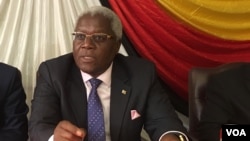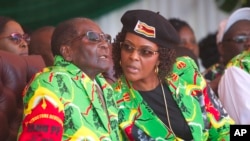Zimbabwe's government has announced that President Robert Mugabe's birthday will now be a public holiday. The announcement is the latest in a series of efforts to secure the longtime leader’s legacy.
Most cities and towns in Zimbabwe have a road named after President Robert Mugabe. In Harare, the public square that most political parties use for rallies also bears his name.
Earlier this month, Zimbabwe’s cash-strapped government announced that it is setting aside $1 billion to establish the Robert Gabriel Mugabe University.
It seems that is not all.
Home Affairs Minister Ignatious Chombo announced Friday that every February 21st, the birthday of Mugabe, will now be a public holiday.
“President Mugabe has exhibited the following values that any fair-minded Zimbabwean would want their youths to emulate: self-sacrifice, selflessness, patriotism, hard work, principled leadership, respect for others, compassion and empathy, among others,” he said.
However, analysts see the move as more of the political jostling that began in earnest last year over Mugabe’s succession.
Rejoice Ngwenya, a political analyst and opposition supporter in Harare, said "we have always been expecting it because the degree of drooling and praise-singing in ZANU-PF has reached unprecedented proportion."
"And I feel that citizens need to be given an opportunity to discuss this before it is legislated," he continued. "... The disadvantage of an authoritarian regime is decisions are taken unilaterally. So it means that very soon we are going to be having a Robert Mugabe everything.”
The 93-year-old leader has said he will run for another term next year. However, he has made at least three trips abroad for medical reasons this year and there has been concern about his health.
One faction of the ruling Zanu-PF is backing first lady Grace Mugabe to succeed her husband. The other faction led by Vice President Emerson Mnangagwa seems to have lost steam this month when its leader was airlifted to neighboring South Africa for medical treatment following suspected food poisoning.
Meanwhile, the Zanu-PF has sought to further consolidate power in the executive with parliament passing a constitutional amendment in late July allowing the president to hand pick all top judges. This would include the chief justice of the Supreme Court who rules on any election disputes.
The new amendment reversed a provision of the constitution passed in 2013 by popular referendum that required all top judges to be selected through public interviews conducted by Zimbabwe’s judiciary service commission.





